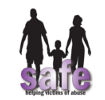What is Domestic Violence?
We define domestic violence as a pattern of abusive behavior in any relationship that is used by one partner to gain or maintain power and control over another intimate partner. Domestic violence can be physical, sexual, emotional, economic, or psychological action(s) or threat of action(s) that influence another person. This includes any behaviors that intimidate, manipulate, humiliate, isolate, frighten, terrorize, coerce, threaten, blame, hurt, injure or wound someone.
Domestic violence can happen to anyone regardless of race, age, sexual orientation, religion or gender. Domestic violence affects people of all socioeconomic backgrounds and education levels. Domestic violence occurs in both opposite-sex and same-sex relationships and can happen to intimate partners who are married, living together or dating.
Domestic violence not only affects those who are abused, but also has a substantial effect on family members, friends, co-workers, other witnesses, and the community at large. Children who grow up witnessing domestic violence are among those seriously affected by this crime. Frequent exposure to violence in the home not only predisposes children to numerous social and physical problems, but also teaches them that violence is a normal way of life; therefore, increasing their risk of becoming society’s next generation of victims and abusers.
Click on image to enlarge:

Have You Been Abused?
Domestic violence is characterized by the pattern of actions that an individual uses to intentionally control or dominate their intimate partner. That is why the words “power and control” are used in the center of the wheel below. Abusers systematically use threats, intimidation, and coercion to instill fear in their partners. These behaviors are the spokes of the wheel. Physical and sexual violence holds it all together. This violence is the rim of the wheel. The power and control wheel was developed by Domestic Abuse Intervention Programs in Duluth, MN. (Insert power and control wheel graphic after this section).
Are You Safe?
A safety plan is a personalized, practical plan that includes ways to remain safe while in a relationship, planning to leave, or after you leave. Safety planning involves how to cope with emotions, tell friends and family about the abuse, take legal action and more. At SAFE, we safety plan with victims, friends and family members – anyone who is concerned about their own safety or the safety of someone else. A good safety plan will have all of the vital information you need and be tailored to your unique situation, and will help you walk through different scenarios.
Although some of the things that you outline in your safety plan may seem obvious, it’s important to remember that in moments of crisis your brain doesn’t function the same way as when you are calm. In crisis, it can be hard to think clearly or make logical decisions about your safety. Having a safety plan laid out in advance can help you protect yourself in those critical moments.
Types of Safety Planning & Leaving a Relationship
Please visit the National Domestic Violence Hotline for an overview of safety planning. SAFE advocates provide personalized safety planning assistance for victims of domestic violence. Please call our crisis line (910.893.7233) for more information and support.

